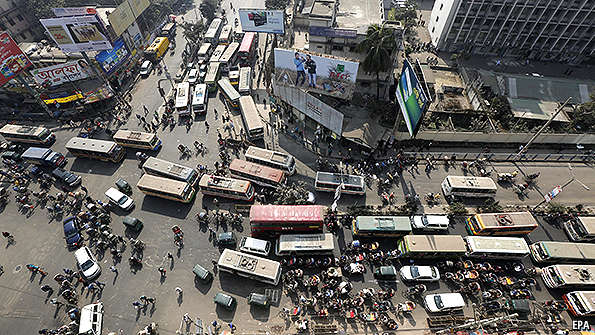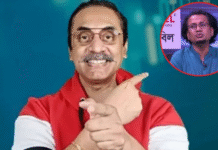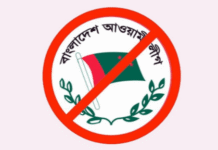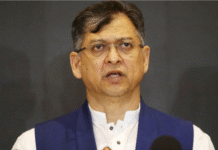by T.J. / BANYAN
FOR the past month Bangladesh, a country of nearly 160m people, has (yet again) been paralysed. The opposition leader, Khaleda Zia, has been confined to a party office in the capital, Dhaka. Her Bangladesh Nationalist Party (BNP) has been staging a nationwide blockade of roads, railways and waterways. The trigger for the unrest was a banned protest to mark the anniversary on January 5th of last year’s election, in which the incumbent Awami League, led by the prime minister, Sheikh Hasina, was re-elected easily thanks to an opposition boycott. Nearly 50 people have been killed and more than 10,000 opposition activists arrested. BNP leaders are mostly in jail, in exile or in hiding, and face criminal charges that will probably bar them from running in the next election. This week events appeared to be reaching a head. The government temporarily cut the electricity supply and internet cables to Mrs Zia’s redoubt. In addition to the crippling blockade, she called a three-day national strike from February 1st. Why has politics degenerated into this mess?
Bangladesh suffers a dysfunctional two-party system, in which the two party leaders, the “battling begums”, wage a personal vendetta at the country’s expense. From 1991 they have rotated in office. Because both parties know that the other will rig elections, polls used to be conducted under an interim caretaker administration. In 2006 Mrs Zia’s party, at the end of a particularly corrupt and incompetent stint in office, tried to rig that system too. The army stepped in to back a non-party “technocratic” government, which after two years held an election won in a landslide by Sheikh Hasina’s Awami League. The party has used its majority to entrench its power, and make it impossible for the BNP ever to win an election: by abolishing the caretaker system, hounding its leaders and banning its largest coalition partner, Jamaat-e-Islami, for its avowedly Islamic platform. Now the government claims it is combating acts of vandalism and terrorism by the BNP. The opposition accuses the government of trying to create a one-party state. Both sides have a point.
The personal animus between the begums has helped foster a winner-takes-all approach to politics in which the futility of rigged elections forces the opposition on to the streets. Both parties are entrenched across the country; attempts, during the technocratic interregnum, to encourage “third forces” to emerge to challenge them proved fruitless. Bangladesh’s neighbours are unable and perhaps unwilling to meddle in the political deadlock. Despite everything, the country has a fair record of developmental success. And India and the West distrust Mrs Zia, seeing her as both willing to allow China a greater role in the country, and as being soft on Islamist extremism. Sheikh Hasina likes to point out that on her watch no big terrorist attack has taken place in Bangladesh. Nor has one elsewhere been traced back to the country.
However, with the BNP’s transport blockade prompting growing unrest, and victims of arson attacks filling the burns units of hospitals, the climate of repression worsening, the army may feel compelled to intervene. Mindful of its reputation (and lucrative UN peacekeeping duties), it will be wary of an outright coup. But it seems highly unlikely the government can be persuaded to treat the unrest as a political crisis and call fresh elections. So the generals may feel, as they did eight years ago, that they have no option other than to call “time out” on a political brawl that neither side can win.
Source: The Economist











It is a no-win no-saint situation though I blame the government for bringing the situation to where it is today – it is their criminal abuse of democracy and brutal use of state power to stay in government that has contributed to the unfortunate and the most dangerous situation that the country has fallen into.